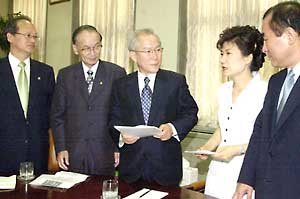North censure on GNP leader Lee

Following the inter-Korean summit talks last month, the political circle has become embroiled into the vortex of inter-party contention over North Korean defamation of main opposition Grand National Party leader, Rep. Lee Hoi-Chang and, as a result, the National Assembly plenary session has been crippled, unable to proceed with parliamentary agenda.
Of a particular note, the center of the ongoing feud has generated from Pyongyang`s official Central News Agency. At this point, the conventional conflict between the ruling and opposition parties as well as conservatives and progressives have been represented by the the flare-up of the fresh dispute as the momentum.
In the wake of the Pyongyang summit in June, tension between the two Koreas has
been significantly eased, but worrisome is the appearance of a new phenomenon of the South-South confrontation.
The recent series of development has taken the following process: the North`s official news agency`s slandering against the GNP president, taking issue with his key-note speech at the Assembly plenary session on July 11, Chong Wa Dae officials` comment on July 12 that the North Korean media had a problem but that Lee`s remarks are also problematic, Rep. GNP lawmaker Kwon Oh-Uhl`s statement at the Assembly that there are pro-North Korean force in the presidential office, the repulsion by the ruling
Millennium Democratic Party members, and the paralysis of the parliamentary session.
In a sense, the development could be "happenings" involving slip of tongue made by some lawmakers. But if closely examined, there were rather "natural causes" behind the
development.
The ruling MDP and the opposition GNP have displayed a wide gap in their assessment of the outcome of the inter-Korean summit and their setting up strategies
toward Pyongyang.
The rival parties have conflicting interests in their schemes to take the political initiative, as a matter of fact. What`s more, the two parties maintain different positions
with regard to their popular support base, evaluation of the Pyongyang leadership and
their ideological background.
In the face of the GNP`s presentation of problems with the inter-Korean summit and related North Korean policy line, the MDP tends to regard it as the GNP`s drive for the next 2003 presidential election or as counter-action stemming from a sort of jealousy.
From this standpoint, the MDP has been critical of the GNP move for its political exploitation of the grand national crusade.
However, the GNP has raised a series of criticism against the ruling camp`s North Korean policy measures, contending that the government is gambling with the people`s huge amount of money at stake.
Therefore, it can be said that this rival parties` hostile sentiment was exploded during the course of the parliamentary session.
In this regard, it is predicted that internal standoff will be continued ahead of the implementation of the South-North family-reunion project and the prospective return visit to Seoul by North Korean Defense Committee chairman Kim Jong-Ll. For President Kim Dae-Jung, he has been tasked for paying heed to various voices from various walks of life, including the opposition GNP, and make them understand the outstanding inter-Korean problems.
Headline News
- Half of working seniors earn less than 1 million won per month
- S. Korea prepares to monitor N. Korean military activities amid POW concerns
- Shinsegae Group officially splits department stores and E-Mart affiliates
- Starbucks issues ‘come to the office 3 times a week or be fired’ notice
- Ha Hyeong-joo chosen as 2024 Sports Hero of Korea







